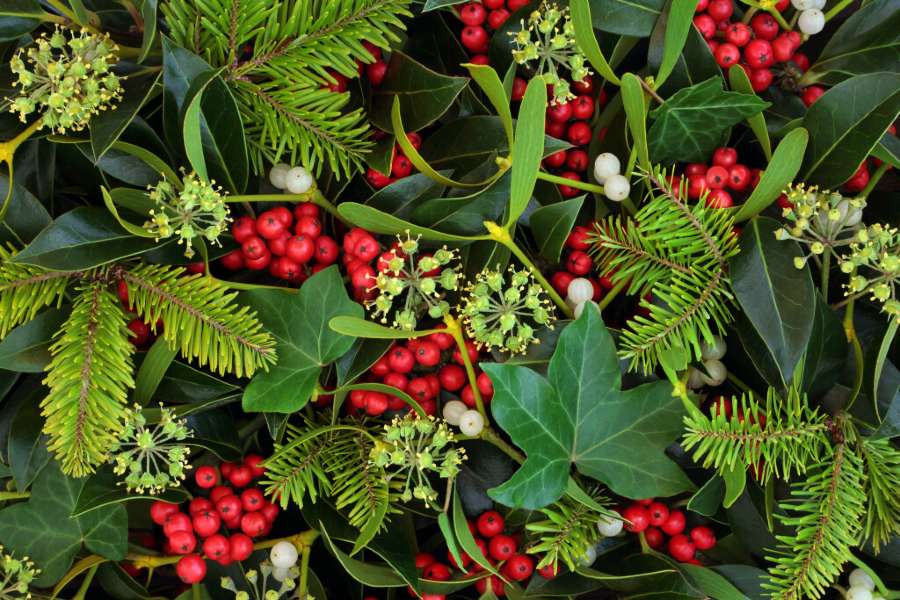As Christmas rolls around, many of us love to deck the halls with festive plants. Things like poinsettia, holly and mistletoe certainly add some winter cheer, but are Christmas plants safe for pets? Some are poisonous to dogs and cats and can cause gastrointestinal problems. If your pet is in the habit of nibbling on plants, you may want to think twice about bringing some of these Christmas plants into your home.
In this blog, we’ll discuss the most common Christmas plants and whether or not they are considered poisonous to cats and dogs.
Are Poinsettias Poisonous to Cats and Dogs?
Poinsettias are a very popular plant to grow indoors over Christmas. They come in a variety of colours, but it’s the traditional crimson red that attracts so many.
A lot of people believe that poinsettias are always fatal for cats but this is something of a myth. In reality, poinsettias are actually not very dangerous to cats compared to some other plants. Dogs would also have to ingest a lot of poinsettia for any real problems to arise.
In fact, the effects of ingesting poinsettia are usually mild. In the vast majority of cases, it will lead to mild gastrointestinal symptoms such as diarrhoea and nausea, along with some oral irritation. In theory, it could be dangerous if enough of the plant is eaten, but this rarely happens due to the unpleasant sensation poinsettia sap creates in the mouth.
Is Mistletoe Poisonous to Dogs and Cats?
Kissing under the mistletoe is a festive tradition, and those iconic white berries add the perfect wintry touch to any festive decor.
Mistletoe leaves, stems and berries are all poisonous, and may cause symptoms such as vomiting and diarrhoea. However, the plant is considered to be of low toxicity to cats and dogs, so large quantities would need to be ingested to cause serious problems.
Are Holly Berries Poisonous to Dogs and Cats?
Perhaps the oldest festive plant, holly is a firm favourite for Christmas wreaths and table decorations.
Holly is another festive plant that is considered to be of low toxicity. Again, ingestion of holly leaves, berries and stems can lead to gastrointestinal issues in cats and dogs like vomiting and diarrhoea. It may also lead to drooling, loss of appetite and lethargy, but cases of serious poisoning from holly are rare.
However, holly leaves are also prickly and could pose a potential choking hazard. See a vet if your pet has any difficulty swallowing, or is coughing or choking after eating holly.
Is Ivy Poisonous to Dogs and Cats?
Ivy is a popular choice for home decoration, and like holly, became beloved because of its evergreen leaves.
Ivy leaves are considered to be of low toxicity to cats and dogs. It could cause vomiting and diarrhoea if ingested, and skin contact with ivy can also cause problems. It can lead to irritation and allergic skin reactions for cats and dogs.
Are Amaryllis Poisonous to Dogs and Cats?
Amaryllis flower indoors during the winter months, so are regularly used to brighten up a home over the festive season. A single bulb can produce a bouquet-like cluster of large, beautiful flowers, and they are very easy to grow.
Eating Amaryllis can lead to symptoms such as vomiting, diarrhoea, abdominal pain, drooling, lethargy and tremors in cats and dogs. The bulb is considered to be the most toxic part of the plant.
Is Christmas Cactus Poisonous to Cats and Dogs?
This pretty house plant flowers between November and January, hence its festive name. Often given as gifts over the Christmas season, they come in red, pink, white and purple varieties.
If only a small amount is ingested, the Christmas cactus is non-toxic to cats or dogs. The Christmas cactus is also not really a cactus! So there are no prickly spines to worry about causing injury.
Having said this, as with many plants, if large quantities are ingested it could still lead to gastrointestinal issues.
Are Real Christmas Trees Safe for Cats and Dogs?
Christmas trees can be a variety of different trees, often spruce, fir or pine. These trees are considered to be of low toxicity.
However, the sharp needles on varieties such as pine trees could cause damage to your pet’s stomach if swallowed.
It’s also worth noting that many fertilisers and plant foods are toxic to cats and dogs. So be careful if you have a potted Christmas tree and plan to use these on it.
And of course, be wary of the decorations you choose to put on your tree. Ingestion of things like tinsel, ribbons and baubles is often what causes more serious damage in cats and dogs, rather than the tree itself.
What To Do If Your Pet Eats a Toxic Plant
While many plants will not cause serious problems, it’s still best to seek veterinary advice as soon as possible if you suspect that your cat or dog has eaten parts of any plants. Some animals may have worse reactions than others, so for peace of mind, always speak to a vet.
You can also call the Animal Poison Line on 01202 509000 to find out whether a trip to the vet is necessary.
If you think your pet has been poisoned, first take your pet away from the suspected source of poison. You should never try to make them vomit, and never give them salt water.
It’s a good idea to take a sample of the suspected cause of poisoning with you to the vets. Alternatively, you can take a picture of it to take along.
Wrapping Up: Poisonous Christmas Plants
Some popular Christmas plants can be toxic to cats and dogs if eaten in large amounts. Having said this, most will only cause mild gastrointestinal discomfort. As long as you keep them well out of reach, they are relatively safe to have in the home.
If you are ever concerned that your pet has ingested something they shouldn’t, always speak to a vet for advice as soon as possible.
Some Christmas foods are dangerous for cats and dogs too. Find out which ones you definitely shouldn’t share with your pet in our blog.
Source: Animal Poison Line
Blog checked by Karin Volker, MRCVS


